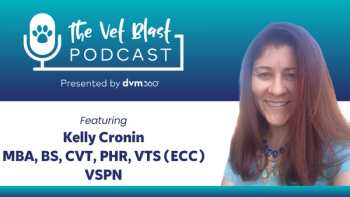
A profoundly unique education experience: Veterinary Leadership Institute
Whether youre ready for the next big step in your veterinary career or stuck in a rut, the Veterinary Leadership Institute is poised to provide in-depth, collaborative, innovative adult education techniques to help you be the veterinary leader your coworkers, your practice and the world need.
When your day-to-day work as a veterinary professional isn't about the medicine, everything else you do every day is about people: managing clients and team members as well as educating them, empowering them, teaching them, inspiring them and, hopefully, helping them.
How do you do all that better? First, you learn about yourself. Self-awareness and self-management are the key to unlocking your own potential as a manager, a leader, a flourishing veterinary professional.
'This is an opportunity for those who are looking for growth to expand themselves and learn to interact with people in a new way.' - Veterinary Leadership Experience facilitator
That's where the
What exactly do you learn at a Veterinary Leadership Experience?
A new model to inspire others: Servant leadership. This model of managing places the onus of success on your ability to help your followers reach their potential. Personal leadership is critical here. When you know yourself and understand both your limits and potential, you can lead with integrity and serve those in your organizations effectively. Servant leaders are more interested in changing the world for the better than they are in self-promotion or power. They seek to listen and understand their followers and in so doing, serve those they work with.
A taste of VLE at Fetch dvm360
•
•
•
•
Already know you want in?
A new way to understand yourself and those around you: Emotional intelligence. Research shows that this is a critical component to success, and it's defined by some researchers as “the ability to engage in sophisticated information processing about one's own and others' emotions and the ability to use this information as a guide to thinking and behavior.” The Veterinary Leadership Institute has created four easy-to-understand competencies under this banner: 1) self-awareness and 2) self-management, both of which contribute to personal leadership; and 3) social awareness and 4) relationship management, both of which contribute to our ability to influence others. These four competencies and the skill sets associated with them prepare you to navigate the personal and interpersonal issues related to supporting, developing, serving and working alongside other people.
'You can't change others unless you change yourself.' - Veterinary Leadership Experience facilitator
A reservoir of newfound strength: Resilience. Leadership is challenging, so you need more than competencies and skill sets. You need resilience, defined as “the capacity to respond to stress in a healthy way such that goals are achieved at minimal psychological and physical cost.” This is about bouncing back after challenges and growing stronger at the same time.
A plan to better listen and explain: Communication skills. Successful communication incorporates verbal and nonverbal signs and is-obviously-critical to effective leadership. Thankfully, the ability to communicate successfully is not an inherent skill. Instead, it's achievable through practice of core skills you can learn and master.
A detour not around but through each day's roadblocks: Conflict management and resolution. Although most individuals avoid them, conflicts can be productive and necessary for growth. Because managers and leaders engage in conflict so much, it's extremely important to learn and improve skills both for your benefit and the benefit of your team, clients and everyone else in your life.
All these skills, concepts and techniques are taught in peer-to-peer collaboration, teamwork and reflective thinking, with the help of expert educators as well as highly trained facilitators in small group settings.
Does it all sound too touchy-feely for you? Don't panic: “It's not a bunch of just talking about your feelings,” says one facilitator. “You're going to do stuff that's been researched and shown to help you be happier and a better leader and to interact with people more effectively. You're in large and small groups to discuss these skills and how they relate to you in your daily life.”
'Increasingly in our world we thrive on superficial interactions. What can I scroll through on my phone to know this person? This is finally an opportunity for a deeper connection.' - Veterinary Leadership Experience attendee
You know when you're ready to take this step: “There are signs inside you that say something's got to change,” says one experienced facilitator. “You don't know what it is, but something has to change.”
Newsletter
From exam room tips to practice management insights, get trusted veterinary news delivered straight to your inbox—subscribe to dvm360.





